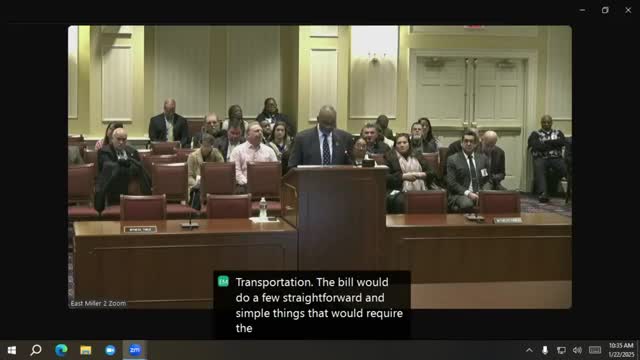Bill would require human-trafficking recognition training for transportation employees

Summary
Senate Bill 7 would require the Maryland Department of Transportation to implement human-trafficking recognition training and reporting procedures for transit-related employees and contractors; advocates asked the committee to include collaboration with the Maryland Human Trafficking Task Force.
Senator Jackson introduced Senate Bill 7 as a targeted reintroduction to require the Maryland Department of Transportation to develop and implement a human-trafficking recognition-and-reporting education program for employees and contractors who work at transit stations, airports, port facilities, bus stations and highway rest stops.
The bill would also encourage audible public-service announcements in transit facilities and require the state to share resources information for victims. Sponsor Senator Jackson said elements of the program and announcements can be modeled on U.S. Department of Homeland Security materials and on earlier successful state efforts to require hotel and innkeeper training and posting.
Survivor-service organizations supported the measure and requested a single amendment: Diana Beason of Turnaround, the designated regional navigator for Baltimore County and Howard County, urged an amendment to require the Department of Transportation to collaborate with the Maryland Human Trafficking Task Force when designing the curriculum. "Requiring the Maryland Department of Transportation to develop or identify and implement a training program to certain transportation sector employees on identifying and reporting suspected human trafficking could quite literally be a matter of life and death," Beason testified.
Fiscal and implementation notes: Committee members asked about a fiscal note that estimated about $455,000 in startup costs tied to programming and overtime. Senator Jackson said the department expects a one-time startup cost and that future onboarding could handle training for new hires; he said the department agreed to partner on the work and that the committee’s budget analysts would scrutinize cost estimates.
Why it matters: Witnesses described Maryland’s highway network and interstates as attractive to traffickers and argued that equipping transit and rest-stop staff with recognition and reporting procedures could help survivors and reduce trafficking incidents.
Ending: Sponsors said they are open to technical amendments, including the requested collaboration language; the bill drew broad support from survivor-service groups and some county governments.

